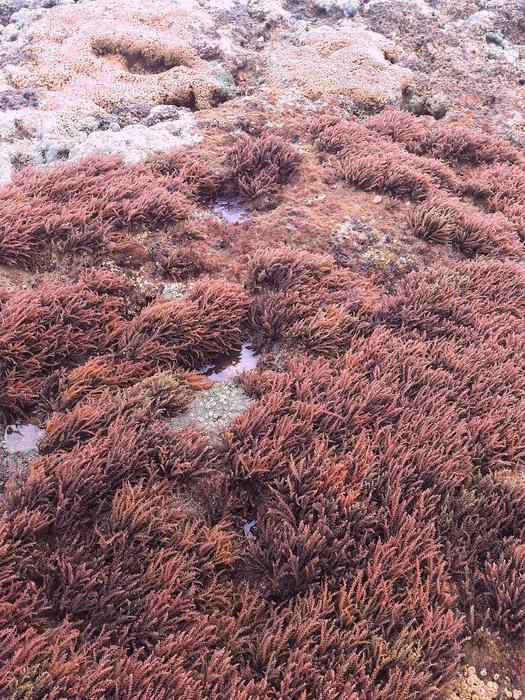Aquaculture is one of the main productive sectors in Ecuador and one of the fastest growing worldwide, which aims to meet the increasing demand for food, in addition to being a sustainable source of animal protein for the human diet. Shrimp is the main organism cultivated in the country, which represents more than 95% of the total aquaculture. Mollusk farming represents around 14.5 % of aquaculture production worldwide, being an important contribution to this sector. Aquaculture has been continuously affected by several diseases caused by pathogenic microorganisms widely distributed in the marine environment, responsible for great economic losses. The genus Vibrio is one of the microorganisms that affect aquaculture in great magnitude, being the bivalve mollusk cultures affected in their first life stages, causing high mortality rates and significant economic losses worldwide.

Credit: Adrián Márquez, FIMCM-CENAIM/ESPOL
Seaweeds, a friendly alternative source for sustainable aquaculture.
Aquaculture is one of the main productive sectors in Ecuador and one of the fastest growing worldwide, which aims to meet the increasing demand for food, in addition to being a sustainable source of animal protein for the human diet. Shrimp is the main organism cultivated in the country, which represents more than 95% of the total aquaculture. Mollusk farming represents around 14.5 % of aquaculture production worldwide, being an important contribution to this sector. Aquaculture has been continuously affected by several diseases caused by pathogenic microorganisms widely distributed in the marine environment, responsible for great economic losses. The genus Vibrio is one of the microorganisms that affect aquaculture in great magnitude, being the bivalve mollusk cultures affected in their first life stages, causing high mortality rates and significant economic losses worldwide.
Seaweeds are marine plants that perform important functions in the marine ecosystem by providing shelter for a wide diversity of organisms. They have an important nutrient content that serves as food for farmed animals, improving their productivity and quality. Certain species are used as food for humans and are considered natural biofilters that improve water quality. In addition, they are a rich source of a variety of metabolites with antibacterial and antiviral activity against diverse pathogens affecting aquaculture, becoming a natural and sustainable source that promotes healthy and environmentally friendly aquaculture production.
Inappropriate antibiotic use increases pathogen resistance
The use of antibiotics has been widely used to control bacterial diseases affecting aquaculture. However, the indiscriminate use of these drugs has led to an increase in pathogen resistance to most of the antibiotics used commercially, which represents a major threat to aquaculture and human health. The spread of resistant bacteria in the marine ecosystem, as well as the transfer of resistance genes to human pathogenic bacteria through contaminated food, are some of the main consequences of the lack of control and excessive use of antibiotics.
For these reasons, it is important to search for novel and natural therapeutic alternatives that can help increase aquaculture production, reduce environmental impact, and improve food and public safety. Several chemical compounds produced by seaweeds have this potential as a natural alternative to the use of commercial antibiotics to reduce and mitigate their adverse effects on humans and the environment.
Natural alternatives to improve production
Seaweeds are a natural and sustainable source of a wide variety of structurally diverse and bioactive chemical compounds with potential applications in the pharmaceutical, nutraceutical, cosmetic, agriculture, aquaculture, and other biotechnological sectors. This study evaluated the in vitro and in vivo bioactivity of the red seaweed Acanthophora spicifera extracts against Vibrio coralliilyticus, a pathogen that affects the larvae of the mollusk Ostrea edulis. The aqueous extract inhibited 43.1% of the growth of V. coralliilyticus at a concentration of 100 mg/L after 46 hours of exposure. In the toxicity test developed with the aqueous seaweed extract, O. edulis larvae reached a survival rate of 91.1% and 84.6% at concentrations of 1 and 5 mg/L respectively. During the challenge test of mollusk larvae against V. coralliilyticus, the aqueous, 10, 25 and 50% ethanol (v/v) extracts, at a concentration of 1 mg/mL, resulted in significantly high survival between 93 and 99%.
The chemical characterization of the bioactive extracts (aqueous and 25% ethanol (v/v)) revealed the presence of succinic acid and the heterosides floridoside and digeneaside as the components with the highest concentration.
In this study, developed by researchers from CENAIM, FCNM, FIMCM, and FCV of ESPOL, in collaboration with researchers from the University of Ghent, the presence of digeneaside in the red seaweed A. spicifera reports for the first time. These results suggest that aqueous and 25% ethanol (v/v) extracts of A. spicifera are a natural alternative for pathogen control management in O. edulis cultures.
Journal
Aquaculture
Method of Research
Experimental study
Subject of Research
Animals
Article Title
Characterized extracts of the tropical red seaweed Acanthophora spicifera protect Ostrea edulis larvae against Vibrio coralliilyticus
Article Publication Date
15-Feb-2024



